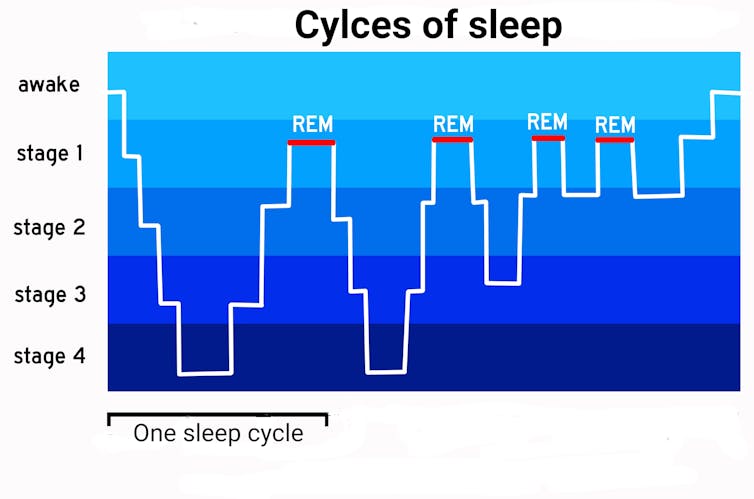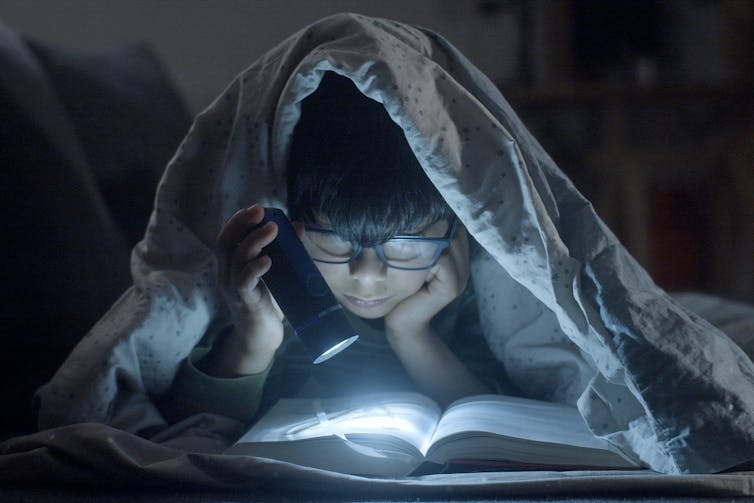
Curious Youngsters is a sequence for kids of all ages. Have a query you’d like an professional to reply? Ship it to CuriousKidsCanada@theconversation.com.
What occurs to your mind if you happen to don’t get sufficient sleep? — Avery, age 7, Napanee, Ont.
Sleep would be the single greatest consider sustaining a wholesome mind and optimistic psychological well being. That is very true in case you are underneath the age of 20.
What’s fascinating — and problematic — is that almost all of us dwell with a sleep debt: in essence we aren’t getting sufficient sleep, so we’re always sleep disadvantaged. And dwelling with a sleep debt has a unfavorable affect on mind operate.

(Shutterstock)
Probably the most frequent indicators of getting a sleep debt is feeling like you might be in a mind fog, the place issues will not be as clear and targeted as they need to be. A scarcity of sleep may make us extra emotional and may contribute to melancholy. Additional, having a sleep debt can impair all your mind’s programs — those that assist notion, reminiscence, consideration, decision-making and even studying.
As a neuroscientist, I’m extraordinarily within the components that affect mind well being and performance. Analysis by my very own laboratory, the Theoretical and Utilized Neuroscience Laboratory on the College of Victoria, demonstrated that sleep is the single greatest predictor of your mind’s skill to type new recollections.
How a lot sleep do folks want?
You may marvel what a standard quantity of sleep is or in case you are getting sufficient sleep. Docs and researchers advocate between seven and 9 hours of sleep per night time for adults. Should you sleep greater than that, it’s price speaking with a physician as a result of oversleeping will be unhealthy for you as effectively.
Nonetheless, it’s totally different for teenagers. Simply after they’re born, infants may must sleep as much as 17 hours a day, and they won’t attain the seven-to-nine-hours vary till the tip of adolescence. College aged youngsters (ages six to 12) usually want 9 to 12 hours of sleep per night time, and youngsters want between eight and 10 hours of sleep an evening.
One fascinating factor that science has proven us is that the circadian rhythm — our our bodies’ pure clock cycle that determines after we sleep — is totally different for youngsters than youthful youngsters and adults. Teenagers’ want to remain up late and sleep in is totally pure.
How sleep works, and the way it impacts mind operate
People cycle by way of 5 totally different phases of sleep every night time: NREM1, NREM2, NREM3, NREM4 and REM sleep.

(Shutterstock)
REM stands for “speedy eye motion” and that is after we dream. NREM stands for “non speedy eye motion” and the phases are ranked from gentle sleep to deep sleep. Gentle — particularly NREM2 — is a essential stage of sleep when recollections type. NREM3 and NREM4 are essential in your physique to get well from accidents and to have power for the subsequent day.
By way of how a scarcity of sleep impacts mind operate, probably the most outstanding working concept is that after we are sleep disadvantaged, it reduces the power of neurons — the cells that make up our mind — to speak with one another. Which means our brains don’t operate as successfully, which results in lowered mind operate, poor mind well being and doubtlessly even psychological well being points.
Find out how to get high quality sleep
What can we do to enhance the standard of our sleep and keep away from having a sleep debt? First, attempt to go to mattress on the similar time each night time and check out waking up on the similar time on daily basis. metric of getting good “sleep well being” is the power to get up at near the identical time on daily basis with no need an alarm clock.

(Pexels/Kampus Manufacturing)
It’s vital to know that you can’t oversleep to make up for a scarcity of sleep. In reality, sleeping in on the weekend is among the worst issues you are able to do to get well from a sleep deficit.
One other factor you are able to do to enhance the standard of your sleep is to keep away from taking a look at screens — telephones, computer systems, TVs — earlier than you go to mattress. The know-how used to make these screens has been proven to extend alertness, making it arduous to go to sleep.
Additionally, make sleep a precedence — it’s higher to fall asleep and let your mind get well than it’s to remain up late finding out. In reality, among the finest issues you are able to do in school to enhance how effectively you study is to get a superb night time’s sleep.
Lastly, having a wholesome, well-balanced weight loss plan and getting adequate train have additionally been proven to enhance sleep well being and sleep high quality.
So ensure you get sufficient sleep. Not getting sufficient sleep is related to lowered mind well being and performance, and may even result in psychological well being issues comparable to nervousness and melancholy.

 The Company for Healthcare Analysis and High quality (AHRQ) awarded funding for a CNTR convention, titled Summit on the Development of Centered Fairness Analysis in Trauma (SAFER-Trauma). The purpose of the summit is to assist the trauma analysis group establish and characterize present gaps in trauma well being disparities analysis, outline funding mechanisms and pathways for collaboration, and description a analysis agenda focused at lowering and eliminating well being disparities in trauma care.
The Company for Healthcare Analysis and High quality (AHRQ) awarded funding for a CNTR convention, titled Summit on the Development of Centered Fairness Analysis in Trauma (SAFER-Trauma). The purpose of the summit is to assist the trauma analysis group establish and characterize present gaps in trauma well being disparities analysis, outline funding mechanisms and pathways for collaboration, and description a analysis agenda focused at lowering and eliminating well being disparities in trauma care.












 Dr Gareth Griffith from the College of Bristol.
Dr Gareth Griffith from the College of Bristol.










